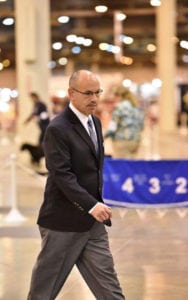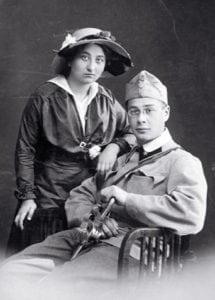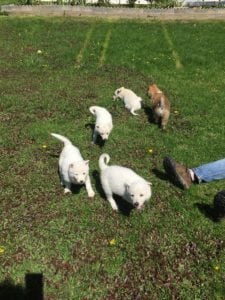
Harry “Butch” Schulman of Louisville will judge Canaan Dogs at a specialty show in Atlanta this October. (photo by Diana Han)
Harry “Butch” Schulman is the quintessential dog person.
Not only has the retired Air Force lieutenant colonel bred collies for years, he is a licensed judge at American Kennel Club (AKC) shows, certified for Herding, Working, Sporting and Terrier breeds.
But he’s fascinated with one breed. Schulman kvells for the Canaan Dog, the only recognized breed in the world with its roots in Israel.
“The history of the breed is connected to my Jewish history and heritage,” Schulman said.
As the Israelis would say, meya acuz (100 percent).
The Canaan Dog is not one of the AKC’s more popular breeds – at least one Louisville family raises them – but Schulman will see plenty of the canines on October 19 when he judges a specialty show for the Canaan Dog Club of America (CDCA) in Atlanta. He also will judge the Herding group, which includes the Canaan Dog, at the November 23 Philadelphia Kennel Club National Dog Show. That event, which falls on Thanksgiving, will be televised at noon on NBC.
“Everything about this breed is Jewish,” Schulman said, “down to the names of the kennels.”
He’s not kidding. A check of the CDCA website turns up names such as Mazel Tov Canaan Dogs, HaTikva Canaans, Dor Vedor, and Kol Tuv Canaan Dogs.
Oh, and the club’s newsletter is called the Canaan Kibitzer.
While the AKC only recently recognized the Canaan Dog, the breed’s lineage dates back more than 2,000 years. In fact, drawings of its ancestors, pariah dogs, have been found on tomb drawings at Beni-Hassan cemetery in Egypt. Ancient Israelites used them to guard their herds.
As the Hebrew population declined, though, many pariah dogs sought refuge in the Negev Desert and became part of the wildlife there. They remained largely undomesticated for centuries, though some lived with Bedouin tribes and the Druze.
Not until the mid-20th century did the breed’s fortunes begin to change.
Dr. Rudolphina Menzel, an Austrian cynologist (canine specialist), and her husband, Rudolph, a physician, trained their dogs to follow Hebrew commands. After the couple fled to Palestine in 1938, the Haganah asked Rudolphina to develop a dog that could guard remote settlements and do other wartime jobs.
Concluding that standard breeds couldn’t handle the region’s harsh climate, she turned to pariah dogs, collecting puppies and adults and starting a program of redomestication.
Menzel found the dogs highly adaptable and quick to learn. She renamed the breed the Canaan Dog, because they came from the land of Canaan, and trained them to perform many wartime tasks, most notably detecting land mines.
Her first Canaan, which she named Dugma – Hebrew for model – became a standard of sorts for the new breed.
“They chose him for his beauty of form,” said Bryna Comsky of Schaumburg, IL, a Canaan Dog breeder for nearly 40 years. “He was a beautiful dog, but his descendants were modeled after him.”
After the war, Menzel trained her dogs to serve the blind through the Institute for Orientation and Mobility of the Blind, which she founded.
She first exported Canaan Dogs to the United States in 1965. It would be another three decades, though, before the AKC finally recognized the breed in 1996.
Comsky remembers that period well. She said the first dogs in the states didn’t always breed true, meaning no two Canaan Dogs were guaranteed to look alike.
“It was diverse in appearance,” she said. “It didn’t have continuity in type.”
That was a red flag for the AKC. “They told us you have to look at a Canaan Dog and recognize this is a Canaan Dog, not an akita, a border collie or a basenji.”
Comsky became interested in the Canaan Dog in 1969 while scanning The New York Times for an ad for basenji pups. Instead, she saw one for Canaan Dogs, which referred to them as “rare gems from Israel.”
The daughter of ardent Zionists and a longtime Israel booster, she was hooked. On her next trip to New York to see her parents, she visited Philadelphia, where the breeder lived, and picked up her first Canaan Dog – named Spatterdash Dreidel.
She quickly bought in to the breeders’ quest to make the Canaans an AKC-recognized breed.
“They told me how important it was to get more Canaan Dogs in the country and around to show continuity of type, so the American Kennel Club would be more likely to recognize them,” she said. “That story caught my attention. I saw it would be a lot of work and striving to take the breed to recognition.”
But it became her life’s work.
“I thought it was the most important thing in the world to get the Canaan Dog recognized by the American Kennel Club; that would insure the existence of the breed.”
Not everyone agrees.
Rob White of Louisville has been raising Canaan Dogs for 20 years. No fan of the AKC, he thinks the traits that advertise the breed’s wild past should be kept.
“To try to come up with a single color or single size, that is not fair to the breed,” White said. “The breed is meant to be somewhat wild and have different sizes and appearances.”
White became a Canaan Dog fan in college when he saw a news item about them.
“It was on the back cover of a Moment Magazine,” he recalled. “They had a little blurb on Canaan Dogs. That just turned on my interest.”
So years later when he was at a dog show in Louisville and met a Canaan Dog breeder, he thought the time was ripe to get one. Today not only does he have a Canaan Dog, so does his son Josh, who also lives here.
But Israel’s breed is not for everyone.
For instance, White won’t recommend them for city dwellers – they bark a lot. Females trend to be more aggressive than males, but generally they don’t trust strangers.
Intelligent dogs, they’re also territorial. “A Canaan Dog will not protect your house,” White said. “A Canaan Dog will protect their house.”

Dr. Rudolphina Menzel, a canine specialist, pictured here with her husband, physician Dr. Rudolph Menzel, domesticated the Canaan Dog for the Haganah. (photo provided by the Center for Jewish History, New York.)
His son Josh was more succinct about the breed.
“It’s like owning a wolf,” he said.
Schulman said it shouldn’t surprise anyone that the Canaan Dog is a far cry from a basset hound sleeping on the couch.
“You have to understand; 1948 is recent history,” he added. “You’re talking about a dog that was domesticated in the middle of the last century. They still have a natural tendency to be very guarded of their territory or flock.”
Even at dog shows, Schulman must be careful about approaching them.
Most Canaan Dogs are found in Jewish population centers – New York, New England, Atlanta, the United Kingdom and Israel.
But it still faces an uncertain future in America.
“I would say it is an endangered species in this country,” Comsky said. “We have 50 dogs registered yearly in the AKC Stud Book (a record of pedigrees going back generations).”
Compare that to the “thousands” of Labs that are registered each year, she said.
That’s one reason why Schulman, executive director of the Department of Ophthalmology and Visual Sciences in the University of Louisville School of Medicine, likes to talk up the breed among Jews.
“I think it’s important that people understand there is a breed of dog that is identified with their history and culture,” he said. “Maybe one or two people read your article and go out and find a Canaan Dog. That’s the beginning of perpetuating the breed in America.”




Love these babies Love Love Love
Just discovered the Canaan breed, I find it interesting.
I have a Canaan/Finnish Spitz female. She is literally one of the best dogs EVER! I’d never heard of a Canaan until I adopted her. Nobody else seems to know about them either when I tell them her breed.